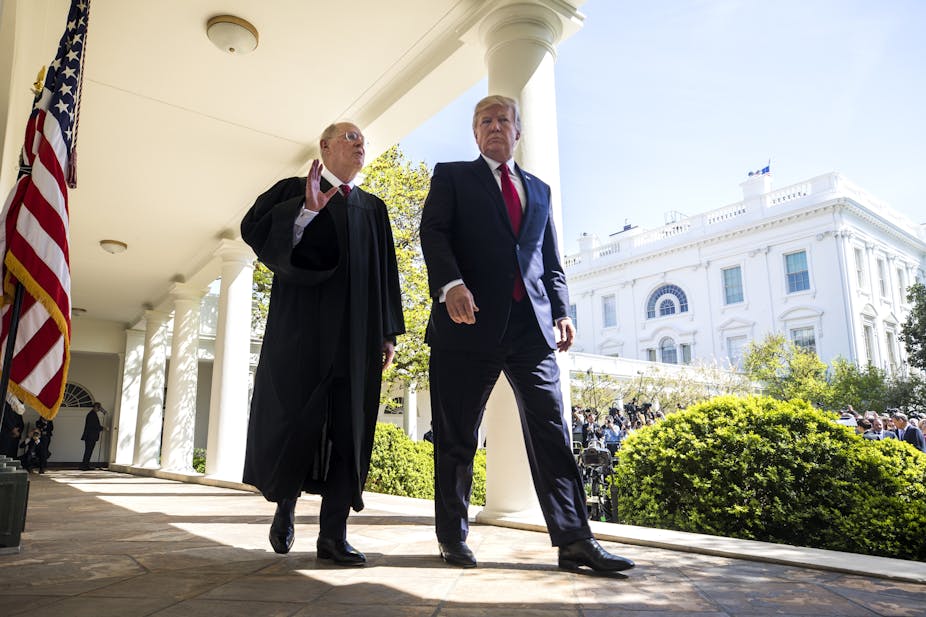Donald Trump was elected president in the middle of perhaps the most contentious battle of recent times over the Supreme Court, as congressional Republicans refused to so much as hold hearings on Barack Obama’s nominee to fill an empty seat on the bench. Less than a month into his tenure, Trump courted controversy by criticising judges who struck down his travel ban on people from several mostly Muslim countries. And now, a little more than a year on from his inauguration, Trump is playing politics with the judicial system more brazenly than any president in recent memory.
Trump has repeatedly suggested that the courts are no different to the other branches of government, that they are as political as Congress or the president. He has specifically accused judges of acting out of political antipathy: “It would be so great for our justice system if they would be able to read a statement and do what’s right,” he fumed in February 2017.
In response, some of Trump’s critics have accused him of ignoring the constitutional limits of his office. But for all the consternation over Trump’s words, the politicisation of the courts – and especially the Supreme Court – is not new. Trump is being more open about it, but he’s far from the first culprit.
Political football
As I’ve written elsewhere, the modern trend to play politics with the Supreme Court dates back to at least 1987, when the Senate rejected Ronald Reagan’s nominee, Robert Bork, who was considered “too conservative”. In 1991, when accused of sexual harassment by former colleague Anita Hill, Clarence Thomas all but accused the all-white Senate Judiciary Committee of racism; in 2010, then-Senate Majority Leader Mitch McConnell described Obama nominee Elena Kagan as “someone who has worked tirelessly to advance a political agenda.” (Kagan and Thomas both sit on the court today.)
Then came the unprecedented 2016 battle over whether Obama should be allowed to fill a vacant Supreme Court seat during his last year in office. Republicans refused to hold hearings on Obama’s nominee, Merrick Garland, claiming the American people should have the opportunity to weigh in via the election process. But their true motives were perhaps best expressed by conservative Texas senator and then-presidential hopeful Ted Cruz: “We cannot afford to lose the Supreme Court for generations to come.” Republicans held out until Obama’s term expired, then swiftly approved Trump’s nominee Neil Gorsuch in early 2017.

The full impact of Gorsuch’s appointment is not yet clear; most of the last term’s major cases were heard before his confirmation, so he did not participate in their resolution. But the few cases in which he wrote opinions indicate that he will turn out to be exactly the kind of justice the Trump Administration hoped: narrowly interpreting the court’s authority, supporting religious rights, and objecting (at least on the surface) to rights for same-sex couples. That he agreed with the reliably right-wing Clarence Thomas in every case will give conservatives plenty of hope.
Trump’s dismissal of judges and rulings he dislikes is of a piece with his general approach to those who disagree with him. Dismissing legal reports and rulings as political opposition plays well with his core supporters. A Reuters poll in November 2017 suggested that in spite of his historically low approval ratings, 85% of those who voted for Trump would do so again. But while his outrageous pronouncements might help Trump himself in the short term, they’re also doing serious damage.
Underminer-in-chief
The US legal system operates on an implicit understanding that while laws may be the result of political activity, once in operation they are applied to all individuals equally, regardless of political affiliation. Where people are convinced that laws apply differently depending on whether the judge is a Democrat or a Republican, the whole system comes into question. Studies already suggest that electing judges rather than appointing them, as happens in many states, undermines the law’s neutrality, and by the same token its legitimacy.
The US Supreme Court has a very particular line to toe. Because its justices are unelected and not term-limited, the court’s legitimacy rests not only on the principle of the rule of law, but also on the idea that its legal decisions aren’t political. The court’s ability to do its job is threatened if a majority of Americans think its decisions are just politics in disguise.

There is evidence to suggest this is already happening. A 2015 Pew Center poll showed dissatisfaction with the court at 43%, a 30-year high. 50% of conservative Republicans thought the court was making “liberal” decisions, while 40% of liberal Democrats thought the court was making “conservative” decisions.
This all has potentially serious implications for the constitution itself. The court is the constitution’s final arbiter; if the court’s institutional legitimacy is undermined, so too is its constitutional privilege. While some might argue that an undemocratic court has no role in a democratic political system (an argument known as the counter-majoritarian difficulty), any move to limit the court’s historical role should be a carefully considered decision, not the incidental result of a game of political football.
So far, none of these disasters has come to pass. The Supreme Court is operational, there is no evidence of non-compliance with its rulings, and the state court system continues much as before. But that doesn’t mean it will always be that way. Trump’s comments about the courts and his attacks on judges are more than bad-tempered outbursts; they exacerbate tensions that could fundamentally weaken the US’s vital institutions.
If that turns out to be Trump’s legal legacy, it’ll matter more than any individual bill, treaty, or executive order ever could.
On February 21, Emma Long joined the panel for The Conversation’s joint event with the British Academy, Trump: How to understand an unconventional President. You can watch the discussion on our Facebook page.

